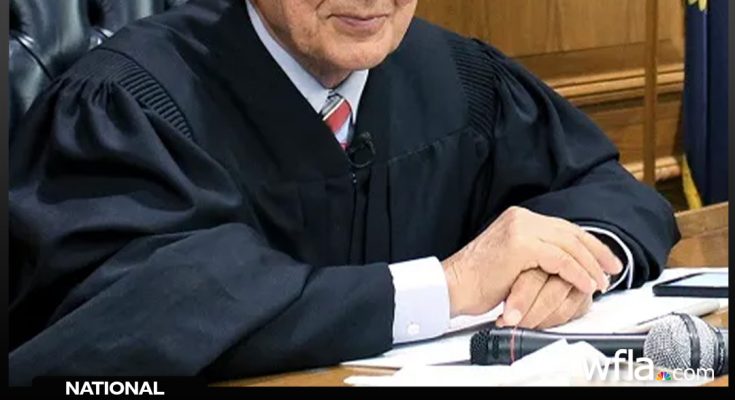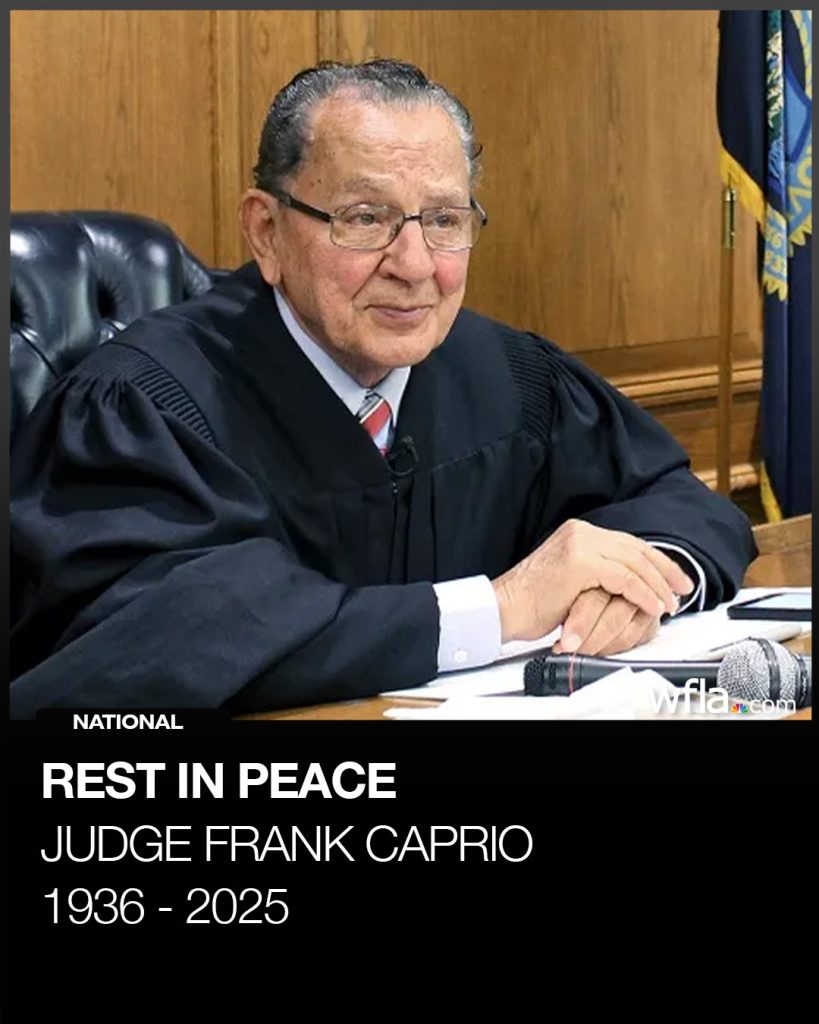Caprio’s path from Federal Hill to international recognition ran through classrooms, council chambers, and a courtroom where he greeted nervous strangers like neighbors. He was, as many admirers called him, the “nicest judge in the world.” But the nickname understates the precision of his craft: he listened. He asked short questions, waited for long answers, and issued rulings that treated due process as a human conversation. In an era thick with cynicism, Caprio’s humility—his willingness to be moved by a parent’s double shift or a student’s bus schedule—read like a revelation.
What follows is a look at the life he built, the courtroom he made famous, and the legacy he leaves with families who recognized themselves in his most generous decisions.
From Federal Hill to the Bench: A Rhode Island Story 🏛️
Frank Caprio’s biography reads like a Rhode Island civics lesson. The son of working-class parents in Providence’s Federal Hill neighborhood, he learned early that work and dignity were inseparable. He shined shoes, delivered newspapers, and rode a milk truck route before school—small jobs that grew into a worldview: people work hard, and systems should meet them where they are. He graduated from Central High School and earned a bachelor’s degree from Providence College. After commencement, he stayed in his hometown to teach American Government at Hope High School, introducing teenagers to rights and responsibilities he would later uphold in court.
Public service drew him beyond the classroom. Caprio served on the Providence City Council in the 1960s and later won election to the Providence Municipal Court in 1985. Over time he became Chief Judge, the steady hand guiding a docket filled with the everyday frictions of urban life: parking tickets, red-light camera flashes, expired registrations, noise complaints. To many, these seemed like small cases. To Caprio, they were the front door to the justice system for ordinary people—first impressions that mattered.
In that courtroom, the law was not an abstract text but a conversation between community and court. His questions sounded like a neighbor’s. His rulings felt like a teacher’s lesson plan: clear, proportionate, and never so harsh that a family would fall behind for a month over a mistake that lasted a minute.
‘Caught in Providence’: The Little Courtroom That Touched the World 🎥
Television rarely celebrates municipal courtrooms. Caught in Providence changed that. Launched locally and later syndicated nationwide, the series placed fixed cameras at the back and sides of Caprio’s courtroom and simply watched. There were no gavel-banging theatrics, no scripted blowups—just real people explaining real problems: a single mom late for a shift, an elder confused by signage, a student juggling multiple buses to campus.
The show’s power was cumulative. Episode by episode, viewers learned to expect two things: accountability for the rules, and allowance for the reality that life is messy. When a defendant’s story revealed hardship, Caprio often reduced or dismissed fines with a short explanation of why mercy served justice in that moment. Clips of those decisions went viral, especially on TikTok and YouTube, where younger audiences encountered a judge whose default setting was human. In 2021, the series earned a Daytime Emmy nomination, a formal nod to what millions already felt—this wasn’t just TV; it was a tutorial in civic kindness.
At a time when viral content often rewarded outrage, Caught in Providence made compassion trend. The show’s gentle rhythms—polite greetings, small jokes, quick facts about a defendant’s life—worked like a balm. Viewers didn’t just clap for dismissed fines; they cheered for a civic ideal: that the law could see people.
The Method: Short Questions, Long Listening 👂
Caprio’s on-camera demeanor—smiling eyes, patient pauses—wasn’t a performance; it was a method. He began with short, precise questions: “What happened that day?” “Who was in the car?” Then he waited. Defendants filled the silence with context usually invisible to bureaucracies: childcare glitches, shift changes, medical appointments, bus transfers that left them sprinting across intersections. He took notes, verified details where needed, and turned back to the rules with an eye to proportion.
In interviews, Caprio framed this approach as both moral and practical. Strictness untethered from reality erodes respect for the law; empathy aligned with facts deepens it. People who feel seen are more likely to pay what they owe when they can, return for new court dates, and keep faith with institutions that rarely extend faith to them first. His rulings, then, weren’t soft. They were strategic: designed to maintain civic cooperation.
The result was a courtroom culture you could feel in the room and online: less fear, more candor, fewer raised voices. That culture didn’t just reduce fines; it raised expectations for how public servants might speak with the public.
A Teacher to the End: Civic Education as a Calling 📘
Long before television, Caprio was a teacher. He never stopped being one. In his courtroom, he explained the why behind rulings in everyday language. He talked about signage, grace periods, probation mechanics, and how to avoid repeat mistakes. He used small cases to show how systems work, correcting misconceptions without condescension. Parents left with more than receipts; teenagers left with a working model of civic responsibility.
That instinct made him a popular guest at schools and community centers. He urged students to learn the stories behind the laws and to see public life as something they could shape. To immigrants and first-generation families, he offered reassurance: the system can feel intimidating, but the people inside it can choose to be kind. For many, that message turned anxiety into confidence at a crucial moment—first tickets, first court dates, first glimpses of a justice system that can welcome rather than repel.
Television widened that classroom to include millions. In living rooms and on phones, families watched a judge who made the law feel like a neighborhood conversation rather than an edict from afar.
Viral Fame and the Power of Small Cases 📱
Caprio’s most-shared moments involved small stakes with big meaning. A grandfather stands before the bench with a citation he cannot afford; a single mom admits she sped because daycare pickup was closing; a student confesses to a lapse that came at the tail end of a double shift. In each case, Caprio listened, recalibrated the penalty, and left the defendant with both accountability and dignity. Viral titles distilled the pattern: “Judge Shows Mercy,” “The Nicest Judge,” “Courtroom Restores Faith in Humanity.”
To critics, this kind of mercy risks unevenness—different outcomes for similar offenses. Caprio answered that concern by grounding decisions in facts he could articulate, a policy he could defend, and a community standard he tried to model: when the rule and reality collide, judgment—the human kind—must enter the room. His consistency wasn’t in outcomes; it was in process: listen, verify, explain.
By dignifying those moments, Caprio elevated the baseline of civic life.
Illness, Grace, and a Final Message 🕊️
Caprio shared his pancreatic cancer diagnosis publicly, a choice that invited the same community he had served to walk a hard road alongside him. In the final months, he posted updates that balanced gratitude with realism. In one of his last messages, delivered from a hospital bed, he asked for prayers once more—an appeal delivered without drama, with the same steady humility that marked his bench. He spoke of the power of prayer, of faith that sees people through setbacks, and of a life’s worth of kindness returned to him in comments and letters.
Those who followed his journey say the updates taught a second kind of civics: how a public figure can handle private suffering with courage and grace. The news of his death arrived as millions were still responding to that final video, a digital vigil for a judge who had spent years caring about strangers’ mornings and afternoons.
It was fitting that the platform that amplified his compassion also carried the prayers and thanks of those he had touched.
What Colleagues and Community Leaders Remember 💬
Praise for Caprio spans constituencies that rarely agree. City officials admired his steadiness. Teachers remembered the colleague who believed the classroom was the seedbed of citizenship. Defendants recalled the day they entered court afraid and left with a plan. Religious leaders noted a faith that expressed itself not in speeches but in how he treated strangers. Business owners saw a judge who could manage order without dampening the energy of a downtown that depends on foot traffic and grace periods.
Tributes from Rhode Island leaders—governors, mayors, legislators—pointed to a simple through line: Caprio made institutions feel human. In a time when many Americans struggled to trust public systems, he gave them reasons to try.
That is no small civic achievement. It is the bedrock on which safer, saner cities get built.
Critiques and Counterpoints: Mercy, Consistency, and the Law ⚖️
Caprio’s approach drew criticism from some corners of legal discourse. Skeptics argued that televised mercy could invite inconsistency—different outcomes for similar infractions. Others worried that viral clips compress complex cases into feel-good moments. Caprio didn’t dismiss these concerns. He addressed them the way he handled cases: directly. He explained his factors on the record, tied reductions to verifiable circumstances, and reiterated that equity is a cornerstone of American jurisprudence, not an exception to it.
In practice, his courtroom operated with a logic many city-dwellers recognize: context matters. A ticket that pushes a family off the budget ledge is not the same as a ticket to someone who can absorb it. The rule is the same; the remedy can differ within lawful bounds. By explaining that distinction in accessible language, Caprio made the public a partner in the legal reasoning—an antidote to the opacity that breeds suspicion.
It’s a view that will continue to animate debates over fines and fees in American cities.
Why His Courtroom Went Global 🌍
Plenty of courtroom shows dramatize conflict. Caprio’s show dramatized understanding. That difference made it exportable. Subtitled clips found audiences in Europe, Asia, the Middle East, and Latin America. People who had never set foot in Providence recognized the situations instantly: a work schedule that doesn’t fit transit routes, a childcare emergency, a warning that became a fine. The translation was effortless because the stories were universal.
Caprio’s success also tapped into a digital hunger for trustworthy authority. Viewers were not invited to cheer defiance of the law, but to watch someone wield authority in a way that strengthened the social contract. In a platform economy that monetizes outrage, his kindness felt like a counterculture—one that still drew millions.
That choice made a local courtroom into a global civics class.
Family, Faith, and the Through Line of a Public Life 🏠
Caprio’s public presence never swallowed his private anchor: family. He often credited his parents’ example—work hard, help neighbors, keep promises—for shaping his instincts on the bench. Friends say his marriage, children, grandchildren, and great‑grandchildren were constant reference points, stories folded into the rhythms of court. Faith, too, threaded the narrative—not as spectacle, but as quiet orientation toward kindness and responsibility.
He told younger lawyers to practice that orientation in their tone as much as their briefs. A soft question can reveal more truth than a hard accusation; a moment of levity can dissolve shame enough to reach an honest answer. Those who clerked in his orbit describe a mentor who cared about the craft of the work and the feel of the room—how people left, not just what they owed.
In that sense, the courtroom clips were not brand-building; they were biography.
Retirement and the Afterlife of a Legacy 📺
Caprio retired from the bench in 2023, a milestone that might have closed a chapter. Instead, the afterlife of his decisions kept growing. Old episodes resurfaced as new viewers stumbled on compilations of his rulings; media tributes reframed his work for audiences who missed the show’s initial run. Teachers assigned courtroom clips in civics, ethics, and media literacy classes. Nonprofits used them in training to discuss de-escalation and trauma-informed practice. The archive became a toolbox.
When his illness became public, the outpouring of gratitude drew a line between those earlier cases and the present: the man who once dismissed a fine because a single mother was juggling two jobs and a toddler now needed strangers’ prayers; strangers responded as if he were family. Few public figures see their influence boomerang back with such warmth.
He did not invent mercy. He showed how to systematize it without sacrificing order.
Numbers, Awards, and the Quiet Metrics That Matter 📊
View counts and Emmy nods are easy metrics. The harder ones live offstage: How many people left court with understanding instead of confusion? How many teenagers saw their first official treat them with kindness? How many families stayed current on rent because a fine was converted to a warning? Those are not numbers the internet tracks, but they are the measures municipal courts feel.
Still, the public markers matter. The Emmy nomination, the millions of subscribers, the sustained popularity of clips years after airing—these aren’t just footnotes; they are evidence that audiences hunger for examples of principled authority. In a time of institutional fatigue, Caprio proved that good government can go viral, too.
That is the kind of influence that outlives broadcasts and headlines.
What His Passing Means for Providence—and Beyond 🏙️
Providence has lost more than a judge; it has lost a civic exemplar. City courts are already evolving—text-message reminders reduce failure-to-appear rates, payment plans replace blunt penalties, and community service substitutes for fines that families cannot absorb. Caprio’s example accelerates those shifts by offering a proof of concept that is both humane and widely understood. When policymakers debate reforms, they can point to a person, not just a policy.
Beyond Providence, jurisdictions grappling with the costs of low‑level enforcement can glean a blueprint: keep rules clear, keep processes human, and keep outcomes proportionate. In that triad, courts can be both efficient and compassionate. Caprio showed that the tradeoff between those values is not as fixed as it looks from a distance.
His passing will likely be marked by tributes—and by line items in reform packages inspired by his approach.
How to Remember Him Well 🕯️
Obituaries summarize. The better tribute is to practice what the person taught. For Frank Caprio, that means three habits within reach of every public servant—and every citizen: ask before you assume, listen before you judge, and explain your decisions in language that dignifies the person across from you. In the checkout line, on a school committee, or behind a desk with a city seal, these habits scale. They turn transactions into relationships and keep communities coherent when life gets complicated.
Families who never met Caprio still feel like they knew him. That is the paradox of televised public life at its best: it makes strangers into neighbors and teaches a tone that spreads faster than policy memos. If you want to honor him, adopt his pace—patient—and his premise—that people trying to hold their lives together deserve the benefit of careful attention.
That is how a municipal courtroom in Providence became part of the world’s emotional vocabulary.
Timeline: Milestones in a Life of Service 🗓️
1936: Born in Providence, Rhode Island; raised in Federal Hill.
1950s: Works a series of jobs while in school; graduates from Central High; earns a bachelor’s from Providence College.
1960s: Teaches American Government at Hope High School; serves on the Providence City Council.
1985: Elected to the Providence Municipal Court; later becomes Chief Judge.
2010s: Caught in Providence episodes gain a national and international audience as clips go viral.
2021: The series receives a Daytime Emmy nomination.
2023: Caprio retires from the bench after nearly 40 years of service.
2025: Dies at 88 after a courageous battle with pancreatic cancer.
Each milestone braided duty with empathy—his signature combination.
Final Take: The Judge Who Made Mercy Make Sense ✅
The stories that define Frank Caprio’s career are disarmingly ordinary: a ticket in the rain, a meter that flipped to red two minutes early, a school drop‑off that ran long. In those stories, he recognized the fragile arithmetic of daily life—the way one fine can tip a month from manageable to impossible. His rulings did not excuse the rules; they humanized their enforcement. That is why strangers felt attached to a judge in a city they had never visited. He took seriously the premise that justice should look like the community it serves—clear, firm, and willing to accommodate reality when reality shows up late with a stroller and a bus transfer.
Frank Caprio’s passing is a loss for Providence and a lesson for anyone who holds authority, from principals to precinct captains. If they emulate his method—short questions, long listening, decisions explained—then his legacy will not be a plaque or a pilot episode. It will be better rooms where ordinary people go to solve problems, and where the scariest part of government becomes a brief conversation that leaves dignity intact. May the memory of the judge who made mercy make sense be a blessing—and a blueprint.




